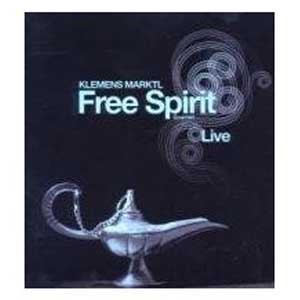
by Ian Mann
October 11, 2010
/ ALBUM
A highly enjoyable album that captures the excitement Marktl and his colleagues are capable of generating in live performance.
Klemens Marktl Free Spirit Quartet
“Live”
(Alessa Records ALR 1015)
Austrian drummer and composer Klemens Marktl is one of the many European and American musicians introduced to British audiences by the indefatigable bassist Michael Janisch. I recently saw Marktl and Janisch perform with Slovenian saxophonist Jure Pukl in his Slavic Soul Trio. That performance at Dempsey’s in Cardiff is reviewed elsewhere on this site.
At the show Marktl was kind enough to give me a review copy of this recording featuring his international Free Spirit Quartet in a live performance in February 2008 at the Porgy & Bess Jazz Club in Vienna. The group features German tenor saxophonist Johanne Enders, American pianist Peter Madsen and Serbian bassist Milan Nikolic in a programme of seven Marktl originals. The music is based on the hard bop and sixties avant garde styles albeit with a contemporary slant and Marktl’s writing pays tribute to some of his jazz heroes among them Bobby Hutcherson, Eric Dolphy and Ornette Coleman. The album’s liner notes are provided by pianist Aaron Goldman, a musician who has worked previously with both Marktl and Michael Janisch.
Marktl’s themes give his musicians plenty of room to stretch out and there’s something of a “blowing session” feel to the music with Enders and Madsen both soloing expansively. However the sophisticated nature of the group interplay makes the performance more than that and adds that all important contemporary edge. The album begins appropriately enough with “The Opener”, a tune written by Marktl on the piano. The hard bop style theme/motif acts as the jumping off point for inspired solos by Madsen and Enders with Marktl and Nikolic providing busy but crisp propulsion. The composer features in a series of inventive, colourful drum breaks in the latter stages of the piece.
“Wiedergeburtsorganisationblues” may have an unwieldy title but it’s an impressive piece of writing that incorporates some more fine playing from the members of the group. The reflective early stages begin with the patter of Marktl’s drums, before bass, piano and fluttering saxophone subsequently slide surreptitiously into the mix. Eventually Nikolic’s bass pulse provides the platform for a shift into an odd meter (5/4) blues that slowly builds in intensity via convincing solos from Enders and the excellent Madsen. Bassist Nikolic is also featured extensively. and there’s something of a drum feature for the composer in the almost “free” section towards the end of the tune. In his liner notes Marktl states that the “stop/start” nature of the piece is a reflection of the uncertainties of life itself.
“Darkness” is a good demonstration of Enders’ ballad skills and opens with a passage of beautifully controlled solo saxophone. The rest of the quartet are suitably sympathetic when they subsequently join the proceedings and Madsen also demonstrates his lyrical side with some delightfully crystalline piano. Nikolic again reveals his considerable abilities with a beautifully judged bass solo.
“Bobby” is Marktl’s tribute to the legendary vibraphonist Bobby Hutcherson, a survivor of the hard bop era and a brilliant and sometimes highly innovative player. The robust hard bop style theme is the platform for some muscular soloing from Enders as Marktl thunders around him. This is clearly Marktl’s way of expressing the “energetic and challenging” side of Hutcherson’s music. The more melodic aspect comes courtesy of Madsen but there’s plenty of fire in his playing too as the group pretty much go for broke for most of the course of this twelve minute track which incorporates a lengthy Marktl drum solo midway through the proceedings.
“Sounds Of A City” represents Marktl’s homage to his adopted second home of New York where he has worked with many of the city’s finest musicians. Urgent, stop start phrases and rapidly shifting time signatures help to sum up the energy and vibrancy of the place with Enders’ saxophone and the leader’s drums playing pivotal roles.
“Song For Rosa”, a dedication to Marktl’s late grandmother, is the album’s other ballad. It begins almost subliminally with glacial free-form tinklings slowly evolving into a warm, breathy tenor sax lament. There’s a good deal of emotion sitting alongside the more avant garde elements.
Finally comes Marktl’s homage to two of his jazz heroes. “When Eric Met Ornette” neatly distils the spirit of Dolphy and Coleman and does so with a sense of humour (is that a Swanee whistle I hear in there?). Knotty, quirky riffs and flowing melodies sit side by side in a piece loosely based on blues forms. Madsen’s chunky, dissonance also throws a Cecil Taylor element into the mix. It’s not a piece for the faint hearted but it closes the album on an energetic high note, teasing the Vienna audience with a series of devilish false endings.
“Free Spirit Quartet Live” is a highly enjoyable album that captures the excitement Marktl and his colleagues are capable of generating in live performance. There’s some fine playing from all four participants, both Enders and Madsen are convincing, erudite soloists and Marktl is a colourful presence behind the drums, subtly stamping his personality on the proceedings. His writing is imaginative, and just detailed enough to provide the framework for some inspired soloing and a high level of group interaction. It’s the latter that gives the record its contemporary edge and ensures that it’s not just a “hard bop by numbers” homage to the past.
blog comments powered by Disqus